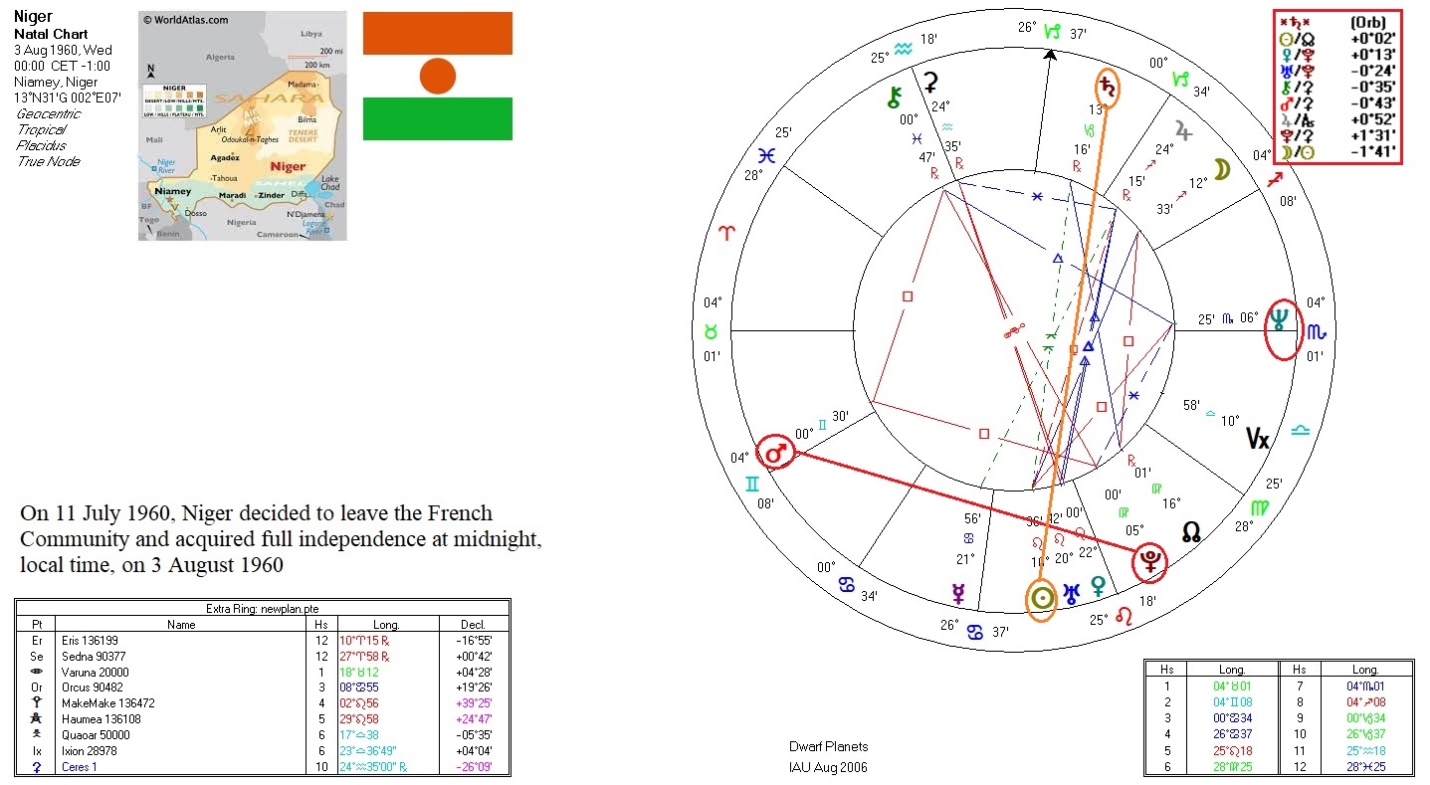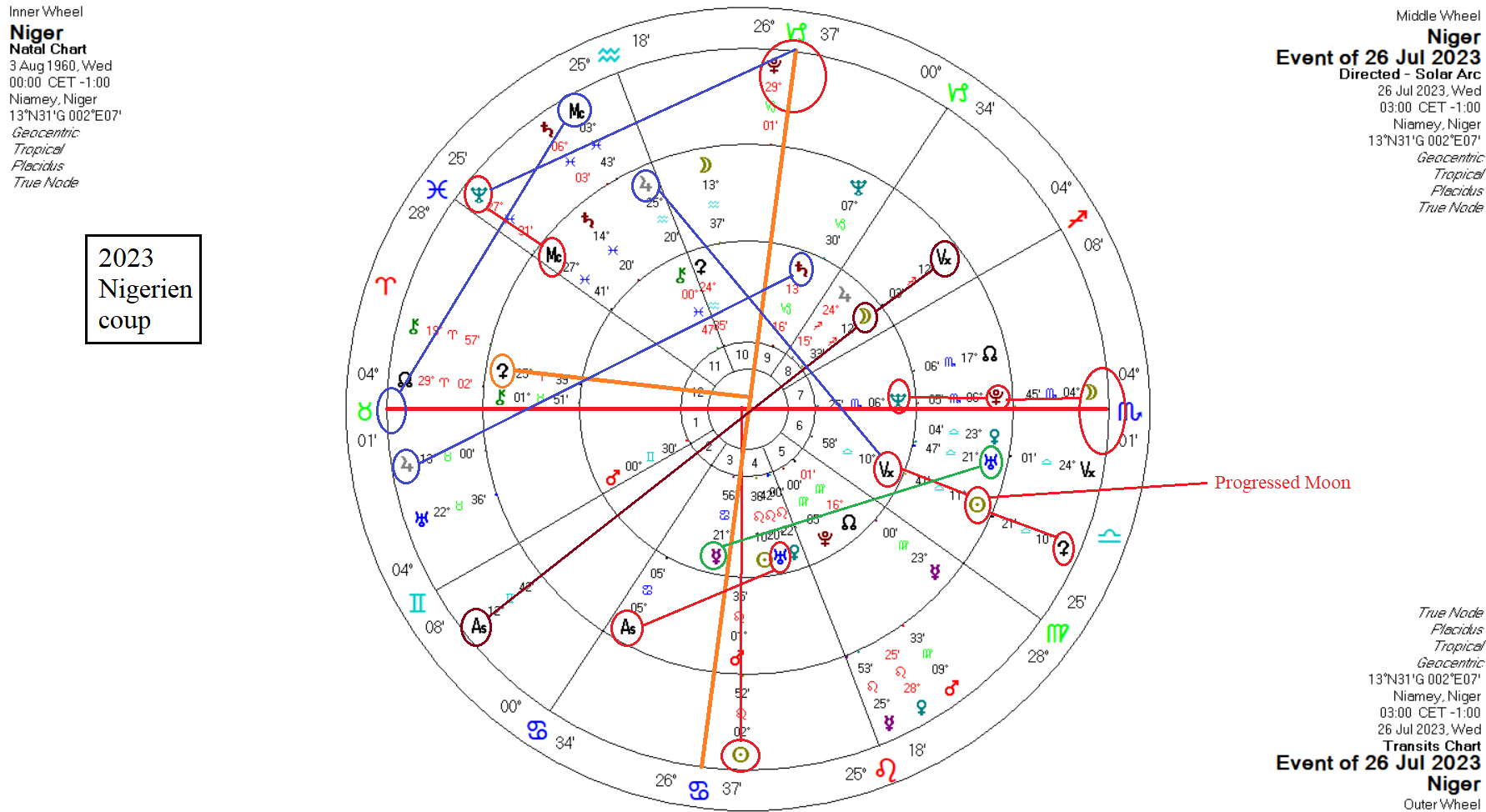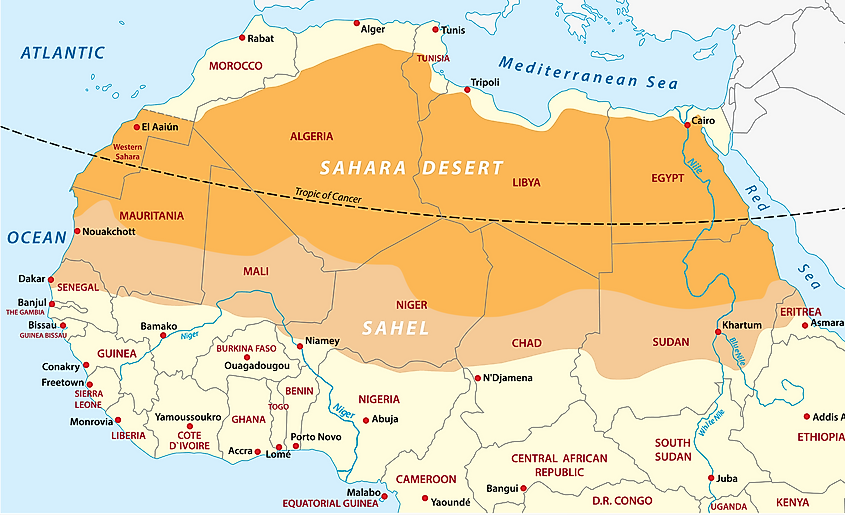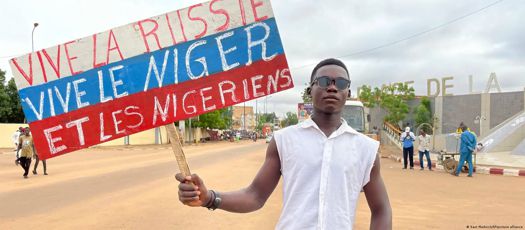On 26 Jul 2023 there was a military coup in Niger. The Western-backed leader, Mohamed Bazoum was detained and confined to house arrest by the presidential guard, led by General Abdourahamane Tchiani. This was the 4th such coup in West Africa within the last three years. It points to a trend, with the old European colonial powers one-by-on being kicked out of their old African colonies. The recent coups were all in the Sahel region of West Africa a region once ruled mostly by France. For more, read on…
This is a preliminary post on the situation there. No doubt there will be more later as events unfold. We will start with the chart for Niger, shown below (bigger):

As shown on the Nigerien chart, Niger gained full independence at midnight local time on 3 August 1960. This gives an independent Leo Sun in wide conjunction with Uranus, the Sun trine to the Moon and linked to Saturn in the ninth house by quincunx. The retrograde Saturn in the ninth house shows the overbearing influence of the old French colonial masters. In addition we see Mars square to Pluto, with Mars at the apex of the t-square with Pluto and Chiron as the base. This shows the periodic painful episodes of the coups that have beset the nation since its independence. We won’t go into those here, except to mention the dates: 15 Apr 1974, 27 Jan 1996, 9 Apr 1999, 18 Feb 2010, 31 Mar 2021, and now the present one. Checking those dates against the chart of Niger would present a good proving of the chart. There is not the space for that here.
Lastly, in terms of major aspects, we see Neptune on the descendent in Scorpio, showing the nebulous and nefarious opposition forces and the nature of the contracts with France that Niger has had, very often to the disadvantage of Niger, along with the influence of the United States.
Niger could be a relatively rich and lucky country, shown by the Sun/Moon trine, but it must first throw off the old neocolonial influence and forge his own sovereign destiny. The Leo Sun trine the Moon shows that it may very well be successful in that regard. That Sun/Moon trine takes away the worst effects of the Sun/Saturn link.
Saturn is the general ruler of the chart, ruling the Midheaven and elevated in the ninth house. The midpoints to Saturn show the overall influence that Saturn has exerted on Niger since its independence. Of special note is the wide Sun/Moon midpoint. It is worth noting the interpretation of that midpoint in full:
Sat=Sun/Moon: Inner inhibitions or repressions, the state of feeling depressed, increasing loneliness, separation from the community, renunciation, difficulties in the relationship with the other sex, joint and shared suffering, illness, separation (divorce).
This midpoint carries more weight than the others because the Sun and the Moon are in aspect and the Sun is aspected to Saturn. Since its independence, Niger has been subject to periodic repressions, sometimes due to coups, sometimes more often due to neo-colonialist policy. The populace has had to practice renunciation, not willingly of course, due to its connections with France. That renunciation, also known as austerity, has resulted in the joint pain and shared suffering of its people, while of interest coups represent a type of divorce between the ruling parties in the ruled. To get an idea of what is has happened last month in Niger we turn next to the chart for the coup itself. The chart is below (bigger):

The coup took place at 3:00 am local time when the presidential guard entered the residence of President Bazoum, placing him under house arrest. The fact the coup was nearly bloodless is shown by the relative inactivity of Mars in the chart of the coup itself.
Directions will most always show up in coups, involving the Midheaven and IC (Meridian axis) and the rulers of those two houses. The immediate stand out in the chart regarding the Meridian axis is the direction of Ceres squaring that axis from the 12th house, meaning no one really saw it coming. Directions of Ceres very often show up in cases where there is a distinct change in direction. The coup was the result of national self sabotage, the president ignoring the will of the people.
The directed midheaven received a transit of Neptune at the time of the coup, with transiting Jupiter trine natal Saturn. Saturn rules the sitting government in this chart. The natal horizon axis received transits of both the Sun and the Moon, the Sun squaring that axis from the fourth house, that house ruling opposition parties. The transiting Moon activated a direction of Pluto to natal Neptune on the day, roughly the 2 to 4 hours after the president was put under house arrest. This was on the descendent of the chart, showing the broken contract. It also shows the broken contracts with the French that have occurred since. From here we can begin to flesh out what all this means.
Niger lies in a belt of nations that stretch from the Red Sea to the Atlantic in a region known as the Sahel, shown in the tan belt below the Sahara Desert (see map below). The French and the West in general have a great interest in controlling that area because it borders the Mediterranean African states and the more fertile tropical and resource-rich regions below the Sahel. In other words, the Sahel is a convenient staging ground for the Western powers in their efforts to maintain Western hegemony over Africa. The Sahel is also where the Western powers have covertly aided various terrorist groups in the region to keep states like Libya (bordering Niger) destabilized. Violent extremism has long been a feature in the region. It is a complicated matter.

There is a video that gives a very good roundup of the recent history that has led to the present conflicts in the Sahel. There are strong tribal themes, with minority groups not feeling themselves to be represented in the democracies of the region. It is a very convoluted matter and history, with the French having made some serious strategic blunders in the region since the turn of this century, and with the Wagner group allegedly stepping in to fill the void.
The Wagner group is known to be active currently in Mali and Sudan in the Sahel, as well as in the Central African Republic (CAR), Madagascar , Mozambique and Libya. They are rumored to also be active in Angola, Zimbabwe and the Democratic Republic of Congo (DRC), just FYI. If the trajectory of events continues as it has for the last few years in the region the Russians, via Wagner, will have influence across the Sahel, from the Atlantic to the Red Sea.
In addition to the Russians, also notable is the influence of the Chinese. Virtually all of Africa’s nations have signed Memoranda of Understanding (MoU) with China’s Belt and Road Initiative. Between Wagner and the Chinese, the Western powers are beside themselves seeking to hold on to their slipping influence in Africa. With this background we have the basis for understanding what is to come for Niger and the wider region.
The coup in Niger took place the day before the Russia-Africa Summit in St. Petersburg this year. This led to speculation the Russians were somehow behind the coup, along with the fact Nigeriens were waving Russian flags in demonstrations in support of the coup. There was no Russian involvement. Niger was not in attendance at the summit. They had other matters at hand. ECOWAS members largely sent their delegations to the summit, their leaders allegedly under pressure from the West not to attend.
The reasons for the coups across the Sahel are fairly straightforward, if not predictable over time:
“Across Sahel countries – from Niger and Mali to Burkina Faso and Chad – pervasive corruption, extreme poverty, widespread unemployment, and the perceived inability of Western partners and international institutions to bring stability to and ensure security in the region have turned local populations against their Western-allied governments, fuelling public support for coups and increasing recruitment capabilities of armed groups.
But there has been one factor, beyond chronic insecurity and economic instability that significantly helped carry military governments to power across the region: growing anti-French sentiment. The memory of French colonialism, defined by brutal military campaigns, forced labour, widespread repression, cultural erasure, racial segregation and forced displacement, is still very much alive in the Sahel region.”
In addition, the Sahel region accounts for “a whopping 43 percent of global terrorism deaths.” The main factor that has the nations of the regions so interested in Russia is because the Soviets were instrumental in helping the nations of Africa to throw off their old colonial masters. From 1880 the “Scramble for Africa” commenced for the European powers, with the French occupying virtually the whole of West Africa in the North, the British dominating in the south and along the eastern coast and with other European states – Italy, Belgium, Germany, Spain and Portugal – colonizing lesser regions. There were only a few independent African states – Ethiopia, Liberia and Egypt. After WWII the whole colonization project began to come undone, largely because Europe lay in tatters after WWII and was powerless and economically unable to exert much of an influence in Africa.
When the USSR collapsed it left a power vacuum as well, wherein the nations the Soviets had aided suddenly withdrew from the Soviet Union as Russia itself became ‘decolonized’ in the eyes of the West. When that happened the Western powers again stepped in and introduced the neoliberal and IMF reforms of neocolonialism to Africa, which was the main game in town economically at the time. With the Russians now stepping back into their own power and sovereignty and with the BRICS gaining steam, and now with Ethiopia and Egypt as some of the newst members of BRICS starting next year, the Russians are again making inroads into Africa. And the Africans are quite welcoming of this, if their attendance at the Russia-Africa Summit this year was any indication.
The West, on the other hand, is aghast at the support many African nations showed toward Russia at the start of the SMO in February of 2022, which ignores the Western support of the European/US backing of elitist regimes in Africa, who were recently called ‘puppet governments’ by the coup leader in Burkina Faso. The West claims the Russians support ‘autocratic regimes’ in Africa, while deliberately avoiding mentioning the repressive regimes they themselves aided and supported.
So, the Western narrative upon learning of the Nigerien coup was to threaten Niger with sanctions and military intervention if the junta (Nigeriens call it the interim government) did not immediately release Bazoum and ‘restore constitutional order’. Apparently there is some dissatisfaction in Niger with that constitutional order. The Western narrative was quite predictable – “We stand with the people of Niger…”; “Niger is a key Western ally in the region…” (meaning France and the US have military bases in Niger); “The Nigerien people have the right to choose their leaders. They have expressed their will through free and fair elections – and that must be respected.” (Then, why do the nations in the Sahel see the Western-backed leaders as Western puppets?), and so on. The deconstructing of the Western narrative is an interesting exercise. Given the Western threats, something quite interesting took place upon other nations of West Africa hearing them.
Burkino Faso and Mali stated openly that any military action against Niger would be seen as a declaration of war against them. Algeria flatly stated military intervention was unacceptable. Algeria has the strongest military in the region and borders Niger. ECOWAS is currently chaired by Nigeria. The chairman had called for military intervention, but the Nigerian parliament voted it down. It was said Nigeria cut the power to Niger, but in fact that has not happened. 70% of Nigeriens subsist without power anyway.
Apparently ECOWAS convened a meeting during which they set a date for military intervention in Niger, but then did not mention when that date might be. ECOWAS can be seen as a sort of ‘African NATO’, with the aim of ‘keeping the East out, the West in and the Africans down’. Apparently an intervention will be soon, given military build-up in the region. They appear to be hedging their bets. Meanwhile Yevgheni Prigozhin had popped up in Africa and declared Wagner is on the job, before his supposed assassination. Where that appearance might have been is anyone’s guess:
“The temperature is 50+ [at least 122 degrees Fahrenheit] – everything as we like. The Wagner PMC makes Russia even greater on all continents and Africa – more free. Justice and happiness for the African people. We’re making life a nightmare for ISIS [ISIL] and al-Qaeda and other bandits,” Prigozhin said. He added Wagner continues to recruit fighters and the group “will fulfil the tasks that were set”. The video is accompanied by a telephone number for those who want to join the mercenary group.”
Wagner was initially requested by African states precisely to combat ISIS and associated groups. And the Africans hold them in high esteem because Wagner does what they say. The Western powers, on the other hand, are seen to be ineffective in that regard. And another reason the Africans see Russians more kindly than the West is because of loans: Russia just forgave $23 billion in African debt, whereas paying back IMF loans is an onerous business. There are other wrinkles to this coup story.
Plans were in the works, especially since the destruction of NordStream for a gas pipeline to run from Nigeria to southern Europe through – you guessed it – Niger. This was the NIGAL, or Trans-Saharan gas pipeline. That pipeline would have cut Russian gas out of Southern Europe to a significant degree. As it stands now, Russia has already made up for the loss of Europe regarding gas, but still it adds an interesting piece.
The pipeline may still go ahead, but the coup in Niger is a major headache for the Western gas giants who were pushing that pipeline. Now, if Niger could wrangle a deal for requisite and fair gas transit fees, the deal could still go ahead. This is perhaps one reason why Algeria is so against military intervention in Niger, as well as why the Nigerian parliament voted down intervention. Military intervention in Niger would destabilize the country for years, thus scuttling the pipeline. Libya gives a good example of the results of such intervention.
Shoigu met with the General of the Army of Algeria after the Nigerien coup in Moscow. Algeria and Russia have had an agreement to enhance security and stability in Africa since 2021. This further puts the possibility of a major military intervention in Niger on the back burner. In addition, an initiative by some locals in the capital of Niger has seen thousands of people queuing outside the stadium to volunteer for military service in support of the interim government.
As for the coup leaders, they say there will be a new government within three years. This was stated in recent meetings by Tchiani when delegations from ECOWAS paid a visit for talks. “Cookies” Nuland had paid a visit a couple of weeks before seeking to force a resolution but was refused an audience with the deposed Bazoum. It was said the talks with the coup leaders (minus Tchiani) were ‘tense’. The recent delegation was not impressed, nor was Nuland, so talk of war is growing louder.
We will know the intervention is imminent when the US withdraws its forces from its drone base near Agadez and their other base near the capital. American troops have been confined to the bases since just after the coup, which would facilitate a bug-out. They are currently looking for alternative sites. And in the newest twist hundreds of Nigerien protesters have given the French a week to leave, or they have vowed to storm the base at Niamey and the French embassy.
Niger has long been exploited by France and other Western powers, notably the US and Canada. The West likes to call this ‘investment’ but Nigeriens see only a fraction of the value that is extracted from the country, mostly because the ore that is extracted is sent off overseas without processing (value-adding) and the nation is left with the detritus. The French company Orano left Niger with 20 million tons of radioactive mud from Uranium mining that produces radon, among other noxious and dangerous pollutants. This was after the company shut up shop and left.
Niger has mineral wealth, the primaries being uranium (the world’s 5th-largest producer), gold, coal and cement. They also have an oil refinery that has the capacity for 20,000 barrels of oil a day, but at present it is underperforming. However, that one refinery could supply all of Niger’s needs and then some. With the largest part of the land of Niger being desert, its minerals would obviously be its biggest source of wealth, if they could manage to value-add to the exports. Mineral refining is virtually non-existent in Niger except for cement.
Around 40% of Nigeriens live in extreme poverty. In terms of the Human Development Index, the country ranks third from the bottom. Only Chad and South Sudan are worse off. This is really what the coup and all the others in the region are about – an end to exploitation, a better life for their people, a fair shake for their products and their sovereignty. It is a long road ahead for Niger and the other nations who have thrown off the West. And there is no doubt there are difficult times ahead.
As it stands at the moment the leaders of the coup have stated they have no interest in the Russians intervening on their behalf and have denied any Russian involvement in the coup. At the moment there will be no Wagnerian opera in Niger. Instead, the trajectory is toward negotiations, with the coup leaders leaning towards the Americans. France is being bypassed – too many old memories. The Nigerien generals had good relations with the US and many of them were trained in the US. Perhaps what all this fuss is about was a wake-up call to the West: the Nigeriens just want a fair deal. If agreements can be reached then civilian rule will return. But they should be careful about Western powers bearing agreements, as the Russians have found out.
The Western powers are not simply going to hand over power and deal fairly when they have had so many years of a free ride in the region. We watch this space with anticipation. Africa is beginning to rise.
Featured pic from Deutsche Welle

